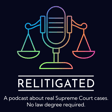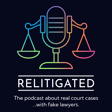
#8 North Carolina v. Alford
In this episode we re-argue the Supreme Court case North Carolina v. Alford.
HA was charged with First-Degree Murder, a capital offense in North Carolina. There was a lot of evidence against him, so his lawyer recommended he plead guilty. HA ultimately agreed to plead guilty to Second-Degree Murder, but when he went before the judge, HA testified he didn’t commit the crime and was only pleading guilty to avoid the death penalty. He was convicted and sentenced to 30 years in prison. He later appealed, stating that he had been coerced into the guilty plea because of the prospect of the death penalty.
The question before the court: is a guilty plea invalid when the defendant is also claiming innocence and is only pleading guilty to avoid the death penalty?

